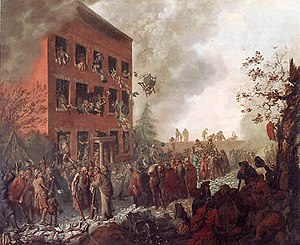
The Priestley Riots (also known as the Birmingham Riots of 1791) took place from 14 July to 17 July 1791 in Birmingham, England; the rioters' main targets were religious dissenters, most notably the politically and theologically controversial Joseph Priestley. Both local and national issues stirred the passions of the rioters, from disagreements over public library book purchases, to controversies over Dissenters' attempts to gain full civil rights and their support of the French Revolution.[1]
The riots started with an attack on the Royal Hotel, Birmingham—the site of a banquet organised in sympathy with the French Revolution. Then, beginning with Priestley's church and home, the rioters attacked or burned four Dissenting chapels, twenty-seven houses, and several businesses. Many of them became intoxicated by liquor that they found while looting, or with which they were bribed to stop burning homes. A small core could not be bribed, however, and remained sober. The rioters burned not only the homes and chapels of Dissenters, but also the homes of people they associated with Dissenters, such as members of the scientific Lunar Society.[2][1]
While the riots were not initiated by Prime Minister William Pitt's administration, the national government was slow to respond to the Dissenters' pleas for help. Local officials seem to have been involved in the planning of the riots, and were later reluctant to prosecute ringleaders. Industrialist James Watt wrote that the riots "divided [Birmingham] into two parties who hate one another mortally".[3] Those who had been attacked gradually left, leaving Birmingham a more conservative city than previously.
- ^ a b Rose, R. B. (1960). "The Priestley Riots of 1791". Past & Present (18): 68–88. doi:10.1093/past/18.1.68. ISSN 0031-2746. JSTOR 649888.
- ^ Libraries, Leeds (26 July 2016). "Panic on the Streets of Birmingham: July, 1791". The Secret Library | Leeds Libraries Heritage Blog. Retrieved 14 July 2023.
- ^ Qtd. in Rose, 83.